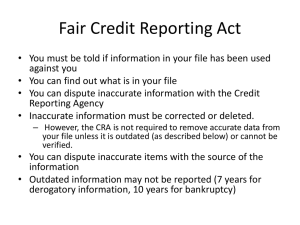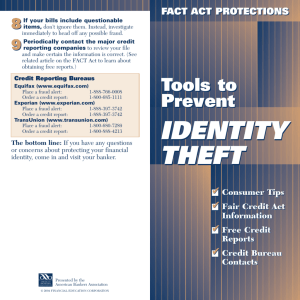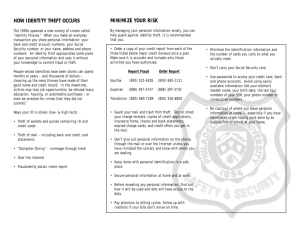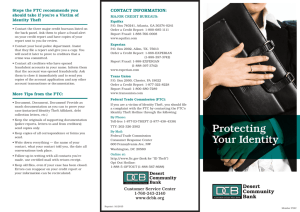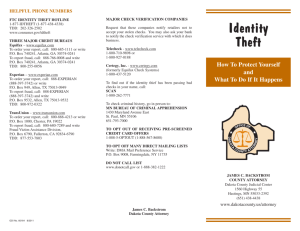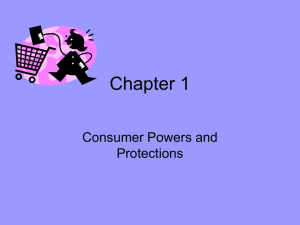SCHOOL OF LAW
advertisement
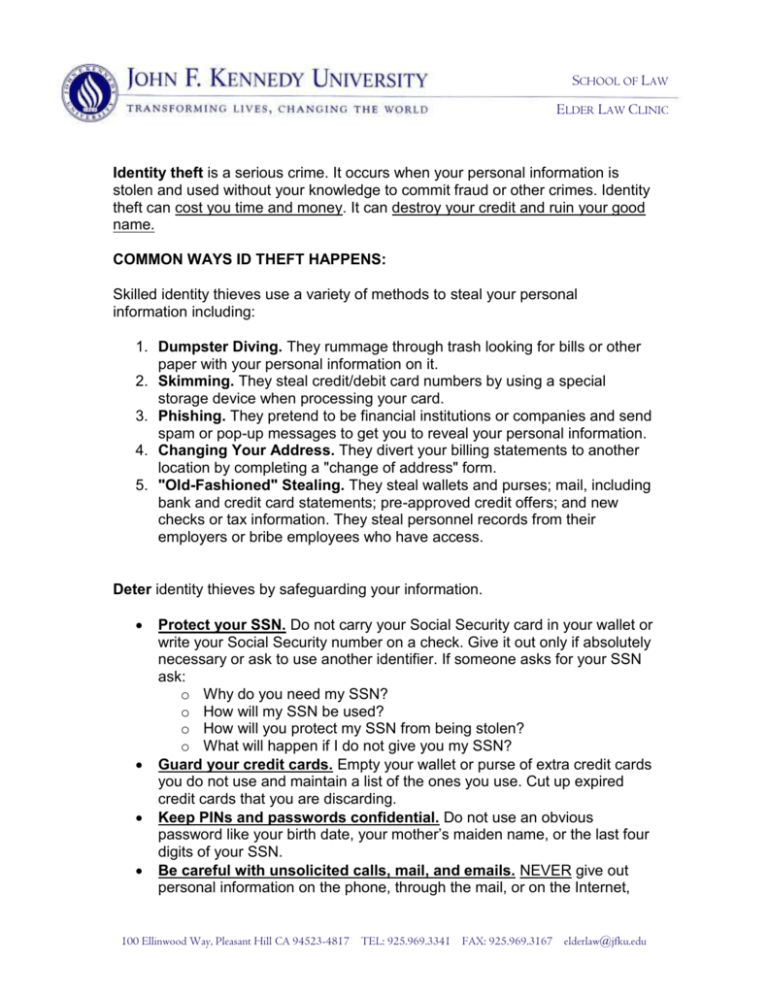
SCHOOL OF LAW ELDER LAW CLINIC Identity theft is a serious crime. It occurs when your personal information is stolen and used without your knowledge to commit fraud or other crimes. Identity theft can cost you time and money. It can destroy your credit and ruin your good name. COMMON WAYS ID THEFT HAPPENS: Skilled identity thieves use a variety of methods to steal your personal information including: 1. Dumpster Diving. They rummage through trash looking for bills or other paper with your personal information on it. 2. Skimming. They steal credit/debit card numbers by using a special storage device when processing your card. 3. Phishing. They pretend to be financial institutions or companies and send spam or pop-up messages to get you to reveal your personal information. 4. Changing Your Address. They divert your billing statements to another location by completing a "change of address" form. 5. "Old-Fashioned" Stealing. They steal wallets and purses; mail, including bank and credit card statements; pre-approved credit offers; and new checks or tax information. They steal personnel records from their employers or bribe employees who have access. Deter identity thieves by safeguarding your information. Protect your SSN. Do not carry your Social Security card in your wallet or write your Social Security number on a check. Give it out only if absolutely necessary or ask to use another identifier. If someone asks for your SSN ask: o Why do you need my SSN? o How will my SSN be used? o How will you protect my SSN from being stolen? o What will happen if I do not give you my SSN? Guard your credit cards. Empty your wallet or purse of extra credit cards you do not use and maintain a list of the ones you use. Cut up expired credit cards that you are discarding. Keep PINs and passwords confidential. Do not use an obvious password like your birth date, your mother’s maiden name, or the last four digits of your SSN. Be careful with unsolicited calls, mail, and emails. NEVER give out personal information on the phone, through the mail, or on the Internet, 100 Ellinwood Way, Pleasant Hill CA 94523-4817 TEL: 925.969.3341 FAX: 925.969.3167 elderlaw@jfku.edu SCHOOL OF LAW ELDER LAW CLINIC unless you have initiated the contact or you are sure you know who you are dealing with. Remember: Some Web sites are frauds NEVER click on links sent in unsolicited emails. Use firewalls, anti-spyware, and anti-virus software to protect your home computer and keep them up-to-date. Shred sensitive material before tossing Always tear or shred your charge receipts, copies of credit applications, insurance forms, physician statements, checks and bank statements, and credit card offers you get in the mail. Protect incoming and outgoing mail Deposit your outgoing mail containing personally identifying information in post office collection boxes or at your local post office, rather than in an unsecured mailbox. Promptly remove mail from your mailbox. If you are planning to be away from home and cannot pick up your mail, call the U.S. Postal Service at 1-800-2758777 or online at www.usps.gov, to request a vacation hold. Store information in secure locations Keep your personal information in a secure place at home, especially if you have roommates, employ outside help or are having work done in your house. Detect suspicious activity by routinely monitoring your financial accounts and billing statements. BE ALERT TO SIGNS THAT REQUIRE IMMEDIATE ATTENTION: Bills that do not arrive as expected Unexpected credit cards or account statements Denials of credit for no apparent reason Calls or letters about purchases you did not make Inspect: 1. Your credit report. Credit reports contain information about you, including what accounts you have and your bill paying history. The law requires the major nationwide consumer reporting companies—Equifax, Experian, and TransUnion—to give you a free copy of your credit report each year if you ask for it. Visit www.AnnualCreditReport.com or call 1-877-322-8228, a service created by these three companies, to order your free credit reports each year. You also can write: Annual Credit Report Request Service, P.O. Box 105281, Atlanta, GA 30348-5281. 100 Ellinwood Way, Pleasant Hill CA 94523-4817 TEL: 925.969.3341 FAX: 925.969.3167 elderlaw@jfku.edu SCHOOL OF LAW ELDER LAW CLINIC 2. Your financial statements. Review financial accounts and billing statements regularly, looking for charges you did not make. Defend against ID theft as soon as you suspect it. Place a "Fraud Alert" on your credit reports, and review the reports carefully. The alert tells creditors to follow certain procedures before they open new accounts in your name or make changes to your existing accounts. The three nationwide consumer reporting companies have toll-free numbers for placing an initial 90-day fraud alert; a call to one company is sufficient: Equifax: 1-800-525-6285 Experian: 1-888-EXPERIAN (397-3742) TransUnion: 1-800-680-7289 Placing a fraud alert entitles you to free copies of your credit reports. Look for inquiries from companies you haven't contacted, accounts you didn't open, and debts on your accounts that you can't explain. Close accounts. Close any accounts that have been tampered with or established fraudulently. The security or fraud departments of each company where an account was opened or changed without your okay. Follow up in writing, with copies of supporting documents. Use the ID Theft Affidavit at ftc.gov/idtheft to support your written statement. Ask for verification that the disputed account has been closed and the fraudulent debts discharged. Keep copies of documents and records of your conversations about the theft. File a police report. File a report with law enforcement officials to help you with creditors who may want proof of the crime. Report the theft to the Federal Trade Commission. Your report helps law enforcement officials across the country in their investigations. Online: ftc.gov/idtheft By phone: 1-877-ID-THEFT (438-4338) or TTY, 1-866-653-4261 By mail: Identity Theft Clearinghouse, Federal Trade Commission, Washington, DC 20580 The information in this communication is provided by the Federal Trade Commission and the Federal Deposit Insurance Corporation. 100 Ellinwood Way, Pleasant Hill CA 94523-4817 TEL: 925.969.3341 FAX: 925.969.3167 elderlaw@jfku.edu
